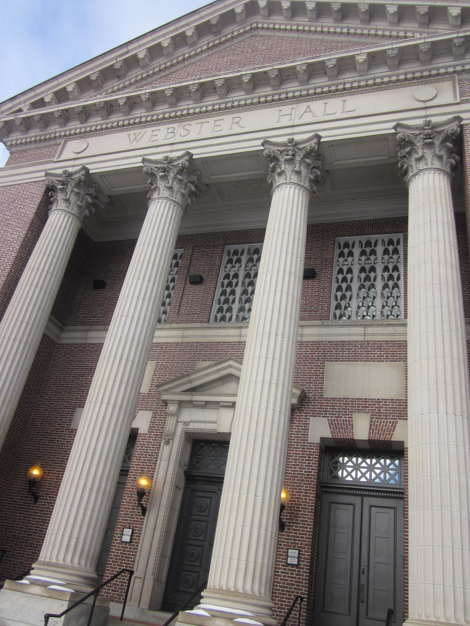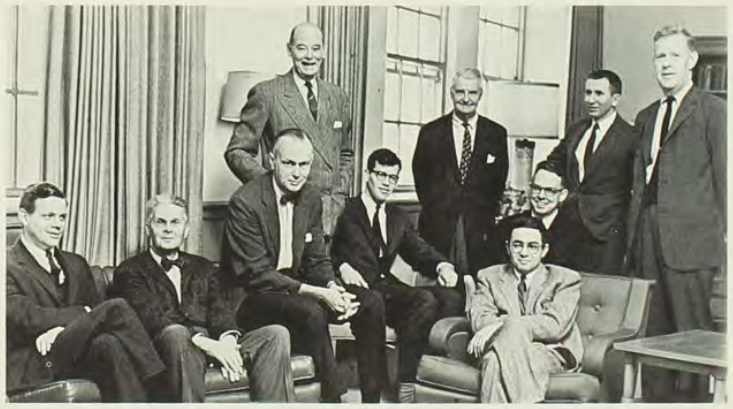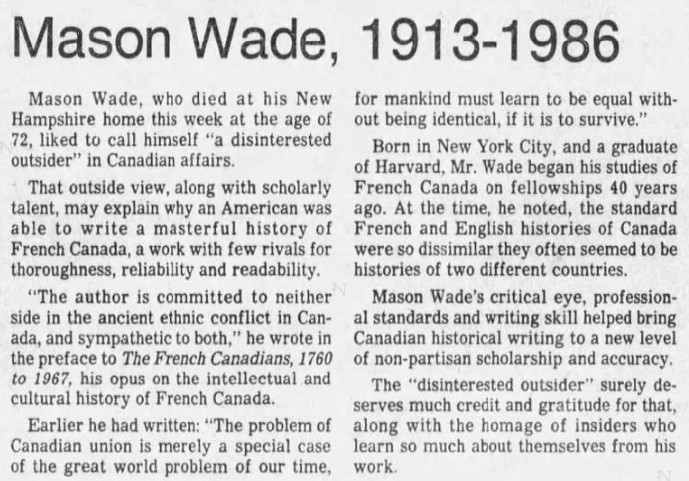The two-hundredth post of Query the Past finds us where we started more than six years ago—with Mason Wade. A twentieth-century historian, Wade earned attention and praise for his biographies of Margaret Fuller and Francis Parkman and later his magnum opus, The French Canadians 1760-1945 (1955). A follow-up post that elicited its own controversy addressed his outsider status.
Wade is generally unknown to young scholars today and not without reason. He was a privileged white male undertaking very traditional history—political and intellectual—just as a new generation of researchers were about to revolutionize the field of research and the profession. Today he might seem to stand for the old ways, which, as we will see, became apparent to him and others as historical practice moved into the 1970s and 1980s.

Still, none of this makes Wade or his body of work irrelevant. In fact, the Hugh Mason Wade Papers at Darmouth College’s Rauner Library shed light on the transformation of the field in the later years of Wade’s career.[1] These archives help us appreciate the cultural context in which he wrote and how, in some respects, little has changed.
To summarize briefly, despite his affluent upbringing, Wade was many times an outsider. Like a fellow Catholic only several years his junior, John F. Kennedy, he experienced exclusion on account of his faith. In the 1940s, a shared faith and his study of Parkman brought him to Quebec. There he sought genuinely to understand the French-Canadian experience, but his first language made his intentions suspect.
Wade connected with professional networks in Canada and, in the mid-1960s, became the first American to serve as president of the Canadian Historical Association (CHA), no small achievement. Nevertheless, he was made to feel like a trespasser. As his papers show, the two decades from his CHA term to his death involved a continuous struggle against what he perceived to be the cultural chauvinism (manifested in anti-Americanism) of the Trudeau era—though by no means confined to the Trudeau government.[2]
Wade’s presidential address, delivered in Vancouver in 1965, readily acknowledged his outsider status. But he did not shy from it. It enabled him to invite Canadian historians to fully recognize American factors in the making of Canada. He challenged a latent, instinctive, reactionary anti-Americanism. In retrospect, his was a modest pitch. Confronting a sore spot in the Canadian collective psyche, he argued that “the task of Canadian historians today is not only to continue to link the once separate histories of two peoples who have jointly made a nation, but also to shed new light on the north-south continental relationship.”

In the early 1970s, the cultural climate added to professional dissatisfaction. Wade left his teaching position at the University of Western Ontario and returned, permanently, to the United States. To a Franco-American correspondent, Jo-Anne De Blois Lapointe, he explained, “J’ai pris ma retraite de l’Université Western à cause de la [sic] chauvinisme enragée dans l’Ontario ces jours-ci, et je suis trèsheureux [sic] d’être encore une fois chez moi dans mon pays” (March 28, 1973).
To put it simply, Wade was continually navigating the awkward triangle of francophone Canada, English Canada, and the United States—to say nothing of religious frictions that marked his younger years. Though still fortunate in many respects, though an agent of his circumstances, he was caught up in rapidly changing identities in Quebec and in the rest of Canada. The Wade Papers are thus a microcosm of much larger forces that helped make the political and cultural world we inhabit.
Wade was not blind to those forces. As a scholar, he saw an opportunity to historicize them and inform a wider reading public. For instance, at the end of the 1960s, he realized that Acadian society was beginning to experience a process of renewal, rejuvenation, and modernization not unlike Quebec’s Quiet Revolution. He aimed to bring that process to the attention of English speakers on both sides of the international border. His French Canadians had won acclaim partly because it coincided with a period of rapid change in Quebec.[3] It provided context to people who had little knowledge of the province and its history outside of a few basic stereotypes. Wade could now do the same with Acadian society—a fitting and timely sequel to The French Canadians.
It was not to be—at least not as he envisioned it. His manuscript faced rejection from numerous publishers on financial grounds. There was no market for Acadia, it seemed. After successive rejections, Wade stated to a colleague, “My Maritime book still remains unpublished, since American publishers are gun-shy about Canadian history and Canadian publishers are leery of American authors these days (no grants in aid of publication from Otttawa [sic] these chauvinistic days). I have published several articles drawn from it, and possibly these will generate some enthusiasm for the book” (September 15, 1976).
The process of peer review highlights other objections. Following reports that criticized typographical errors and insufficient acknowledgment of recent sources, Wade complained to Denise Lachance of the Social Science Federation of Canada of the “futility of replying to readers who seemingly had not read or understood what they were criticizing.” In defense of the viewpoint he brought to the subject, he added, “Sometimesxan [sic] outsider sees more clearly than those engaged in the struggle within, and particularly in this field so rich in racial, denominational, and regional feuds” (December 2, 1982). Nevertheless, it seemed clear that the old-fashioned approach that had carried The French Canadians to a place of prominence and influence would not do in the 1970s and 1980s.

Correspondence from the Wade Papers also suggests that he lost much of the intellectual network he had had in Quebec in the 1940s and 1950s. His primary francophone pen pal in the final phase of his career appears to have been the Acadian scholar Anselme Chiasson. That may have made sense in light of Wade’s changing research interests. At the same time, it helps explain why, aside from writing in English, his footprint in Quebec quickly faded. He had few peers and inheritors who could carry his legacy forward (Yves Roby being an exception).
That legacy involves the persistent challenge and value of crossing intellectual and cultural boundaries, which, between anti-Americanism, Quebec neo-nationalism, and U.S. ignorance of the North American French element, is still very much with us.
Further Reading
Mason Wade’s unpublished memoirs are available in his papers at Dartmouth.
Sections of Wade’s Maritime history manuscript were published posthumously in Mason Wade, Acadia and Quebec: The Perception of an Outsider, edited by Naomi E. S. Griffiths and George A. Rawlyk (1991). This work also includes analytical texts on his body of work by students and peers.
Readers may also be interested in a special issue of Mens titled “Le ‘moment américain’ des universitaires québécois: appropriations, transferts et réseaux (1930-1960),” which discusses cross-border intellectual networks. One of the contributors, François-Olivier Dorais, has conducted research on Mason Wade.
[1] Wade was a long-time resident of Cornish, New Hampshire, located twenty miles south of the Dartmouth campus in Hanover.
[2] There is some irony in that Trudeau and Wade had corresponded and collaborated in the 1950s. Though both were committed to better understanding between English and French Canadians, international events, the Vietnam War being foremost, propelled an anti-Americanism that Wade felt bitterly.
[3] The acclaim was palpable but not universal. Popular outlets of both languages were generally approving. Some French-Canadian intellectuals expressed reservations. Richard Arès believed The French Canadians would confirm English speakers in their prejudices; Guy Frégault took issue with Wade’s treatment of Lafontaine and Bourassa and thus of a political project that he (Frégault) deemed unworkable. On the other hand, in Cité Libre, after a light critique, Pierre Trudeau wrote, “les résultats sont généralement excellents.”
Leave a Reply